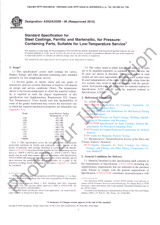Wir benötigen Ihre Einwilligung zur Verwendung der einzelnen Daten, damit Sie unter anderem Informationen zu Ihren Interessen einsehen können. Klicken Sie auf "OK", um Ihre Zustimmung zu erteilen.
ASTM D7237-18
Standard Test Method for Free Cyanide and Aquatic Free Cyanide with Flow Injection Analysis (FIA) Utilizing Gas Diffusion Separation and Amperometric Detection
Name übersetzen
NORM herausgegeben am 1.12.2018
Informationen über die Norm:
Bezeichnung normen: ASTM D7237-18
Ausgabedatum normen: 1.12.2018
SKU: NS-910546
Zahl der Seiten: 11
Gewicht ca.: 33 g (0.07 Pfund)
Land: Amerikanische technische Norm
Kategorie: Technische Normen ASTM
Kategorie - ähnliche Normen:
Die Annotation des Normtextes ASTM D7237-18 :
Keywords:
amperometry, aquatic free cyanide, diffusible cyanide, flow injection analysis, free cyanide, gas diffusion separation,, ICS Number Code 13.060.50 (Examination of water for chemical substances)
Ergänzende Informationen
| Significance and Use | ||||||||||||||||||||||||||||||||
|
5.1 Cyanide and hydrogen cyanide are highly toxic. Regulations have been established to require the monitoring of cyanide in industrial and domestic wastes and surface waters.5.2 It is useful to determine the aquatic free cyanide to establish an index of toxicity when a wastewater is introduced into the natural environment at a given pH and temperature. 5.3 This test method is applicable for natural water, saline waters, and wastewater effluent. 5.4 Free cyanide measured using this test method is applicable for implementation of the International Cyanide Code Guidance in accordance with Guide D7728. |
||||||||||||||||||||||||||||||||
| 1. Scope | ||||||||||||||||||||||||||||||||
|
1.1 This test method is used to establish the concentration of free cyanide in an aqueous wastewater, effluent and in-stream free cyanide concentrations after mixing treated water with receiving water. The test conditions of this test method are used to measure free cyanide (HCN and CN–) and cyanide bound in the metal-cyanide complexes that are easily dissociated into free cyanide ions at the pH of 6. Free cyanide is determined at pH 6 at room temperature. The aquatic free cyanide can be determined by matching the pH to the water in the receiving environment in the range of pH 6 to 8. The extent of HCN formation is less dependent on temperature than the pH; however, the temperature can be regulated if deemed necessary for aquatic free cyanide to further simulate the actual aquatic environment. 1.2 The free cyanide test method is based on the same instrumentation and technology that is described in Test Method D6888, but employs milder conditions (pH 6–8 buffer versus HCl or H2SO4 in the reagent stream), and does not utilize ligand displacement reagents. 1.3 The aquatic free cyanide measured by this procedure should be similar to actual levels of HCN in the original aquatic environment. This in turn may give a reliable index of toxicity to aquatic organisms. 1.4 This procedure is applicable over a range of approximately 5 to 500 μg/L (parts per billion) free cyanide. Sample dilution may increase cyanide recoveries depending on the cyanide speciation; therefore, it is not recommended to dilute samples. Higher concentrations can be analyzed by increasing the range of calibration standards or with a lower injection volume. In accordance with Guide E1763 and Practice D6512 the lower scope limit was determined to be 9 μg/L for chlorinated gold leaching barren effluent water and the IQE1.5 The values stated in SI units are to be regarded as standard. No other units of measurement are included in this standard. 1.6 This test method is not recommended for samples that contain reduced sulfur compounds such as sulfides. 1.7 This standard does not purport to address all of the safety concerns, if any, associated with its use. It is the responsibility of the user of this standard to establish appropriate safety, health, and environmental practices and determine the applicability of regulatory limitations prior to use. 1.8 This international standard was developed in accordance with internationally recognized principles on standardization established in the Decision on Principles for the Development of International Standards, Guides and Recommendations issued by the World Trade Organization Technical Barriers to Trade (TBT) Committee. |
||||||||||||||||||||||||||||||||
| 2. Referenced Documents | ||||||||||||||||||||||||||||||||
|
Empfehlungen:
Aktualisierung der technischen Normen
Wollen Sie sich sicher sein, dass Sie nur die gültigen technischen Normen verwenden?
Wir bieten Ihnen eine Lösung, die Ihnen eine Monatsübersicht über die Aktualität der von Ihnen angewandten Normen sicher stellt.
Brauchen Sie mehr Informationen? Sehen Sie sich diese Seite an.




 Cookies
Cookies
